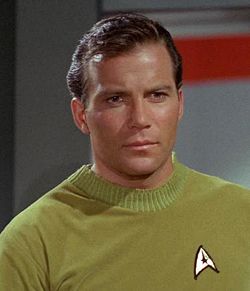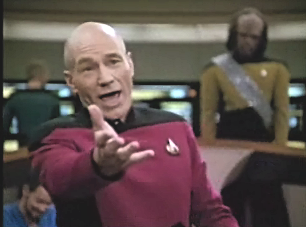WHY KIRK IS MYTHIC AND PICARD IS NOT Guest Blog by Sarah Beach
With the arrival of the new STAR TREK movie, the natures of the various
characters of the STAR TREK universe have become ripe for new discussions.
Fans of NEXT GENERATION have often bickered with fans of the Original
Series as to whether Kirk or Picard is the better Captain. There are fans
who prefer DEEP SPACE 9 over VOYAGER. There are even (though I’m not sure why) fans of ENTERPRISE.
I’m not trying to set up an argument about which series is better,
particularly not between the Original Series and NEXT GENERATION. And I
am certainly not out to say that of the two series a person should prefer
one series over the other.
But….
On the most basic level, Kirk has become a mythic figure while Picard
remains just the Leader-Hero of a series of stories.
Let’s start with the points where Kirk and Picard are similar. Both are
Starship Captains (Kirk’s later rank of Admiral is beside the point), who
command considerable respect from their crews. They are both highly
competent at their jobs. These qualitites make them both worthy of our
attention as the heroes of their cycles of stories.
So what makes the difference? Kirk is brash, roguish, not by-the-book; he
is passionate, unconventional and egotistical. Picard is controlled,
precise, knows protocol backward and forward; he is committed, but
emotionally reserved, and although he has a strong ego, he is not the
egotist Kirk is. Is there enough in those characteristics to justify my
saying Kirk is mythic and Picard is not?
There are several archetypes which can bulk up a character to mythic
stature. Because the archetypes are present in even ordinary characters,
it is not the simple presence of a type which make one mythic. It is the
particular mix of types and the importance of the character in the story.

For starters then, we can agree that both Kirk and Picard are important
for their stories. They are, basically, the archetype of the Hero, the
central character. That of itself will not elevate either to the level of
mythic figure. They are both also leaders, what I have labeled as Rulers
(in my book THE SCRIBBLER’S GUIDE TO THE LAND OF MYTH). As Rulers, they frequently make judgements of their followers and of others they encounter, making
decisions about what should happen. Again, these are qualities found in
many core characters and are not quite enough to boost either into the
realm of mythic figures.
It is the next level of characteristics that starts putting distance
between the characters. In addition to the ruler, one of a secondary set
of character archetypes I developed is the one I call the Transformer.
The Transformer is one who makes things change, often by his actions, but
also simply by being who he is in a particular setting. Things change
around a Transformer, simply because he is there, whether by his actions
or not.
This is where Kirk starts to edge out Picard. Yes, there are stories
where Picard works a change in circumstances, but it is usually not
because he wants to change things or even because he is merely present.
Picard often starts from a position of attempting to preserve the status
quo. In part, because the writers wanted to take a different approach
with NEXT GENERATION, Picard frequently tries to abide by the Federation
Prime Directive (of non-interference with other cultures). Kirk, on the
other hand, is a natural walking disruptive force. His entrance to a
scene changes the balance immediately. Things happen around him, becausehe is there. If Picard walks into a scene something might happen, but there is no certainty. If Kirk walks into a scene something definitely will happen.
Still, is that enough to elevate Kirk to mythic stature? Perhaps not.
There is, however, one final element that completes the tipping of the scale.
Of the seven traditional character archetypes (Hero, Mentor, Threshold
Guardian, Herald, Shapeshifter, Shadow and Trickster), it is the Trickster
who frequently acts as the Culture Hero in a society. Although the
Trickster is often the smaller creature who has to find ways of besting
larger adversaries, it is just those qualities that help Mythic Tricksters
establish their cultures. For instance, the Polynesian Trickster Maui
drew islands up out of the ocean floor for humans to live on, and he
slowed down the sun so humans would have more time to do things. Of
course, not all Tricksters come with the positive baggage of being a
Culture Hero. Loki, of Norse mythology, is a malignant force, always
trying to undercut the gods of Asgard. He is destructive and malevolent.
This is where Kirk leaves Picard in the dust. Picard is the chess player,
each move calculated and according to prescribed rules. Kirk is the poker
player, who will outbluff his opponent even while holding a losing hand.
The “only cadet to beat the Kobayashi Maru scenario.” The one who can be
beaten down but not defeated. He will always look for the better
alternative, even if it is not obvious. It comes down to the question of
“Which one would you chose to save the world?” Many want to say Picard,
because he is indeed a sterling character and worthy of admiration. But,
if it is necessary to throw off convention to “save the day,” if it is
necessary to leap blindly to get to the goal first, who do you look to?
For one of these two, those sorts of actions are at the very core of his
being and for the other it is not. In the race to save the crew, the
world, the universe, it is James Tiberius Kirk for the win.
And that is what makes Kirk mythic.

Sarah’s previous guest blog entitled “Says the Screenwriter, Writing a Graphic Novel is Easy!” can be found here.
About Sarah:
Born to the rolling landscape of Michigan, I got
transplanted to the flat coastal plains of Houston, Texas when I was 16.
Retreating from the world (at least as much as an extrovert is capable of
that), I began working on my writing during endless hours. Artwork
continued to be an important recreation. Along the way, I earned a
Bachelor’s and Master’s in English, and became a medieval scholar.
However, Academia was not my cup of tea, so I eventually moved on to the entertainment business (and the mountains of Los Angeles). After 18 years of doing fact-checking for Jeopardy!, I’m now back to immersing myself in my own writing. And even the recreational artwork is coming back.
In the midst of all that, I labored and brought forth THE SCRIBBLER’S GUIDE TO THE LAND OF MYTH, which involved four years of writing, research, and review of over 150 films and television episodes. The website for the book is here.
My personal website devoted to broader writing interests can be found at Scribblerworks.
Entire contents of this post copyright 2009 by Sarah Beach. Used with permission.

5 Comments
Colleen
Kirk.
Hair.
Kirk wins.
tyg
I think there are a couple of other reasons. First off, Kirk was, well, first. While it can be done (although I’ll admit I’m not coming up with a good example off the top of my head), I’d think it’d be much harder to also become mythic or iconic when a character in the same role and same genre (and in this case, a very specific setting/universe level beyond that) is already such.
And related, there were meta-reasons for Kirk to become mythic. As far as I can recall, there hadn’t been a television/huge audience visual mass media spaceship captain done seriously for some time when he debuted. No, I don’t count Lost in Space as serious. And the various space shows of the 50s had been off the air for several years.
But the 60s were also when the space program was in full bloom. So there was a hole for a mythic character to step into. It also didn’t hurt that TOS was being constantly rerun for years, and Kirk still had little if any competition in his mythic role for close to a decade. That reinforced his rise to mythic. I figure Han Solo, while different from Kirk in many ways, was the next such mythic space captain character to really hit.
scribblerworks
Good points, tyg. And yes, I agree that “coming first” had something to do with the matter of mythic status. I do think that the intital writers for NEXT GENERATION, created Picard to be Not-Kirk (although not exactly the Anti-Kirk). It’s possible they could have achieved a character of more mythic stature, but they made him very cautious from the start, in a way that stuck.
Pingback:
Pingback: